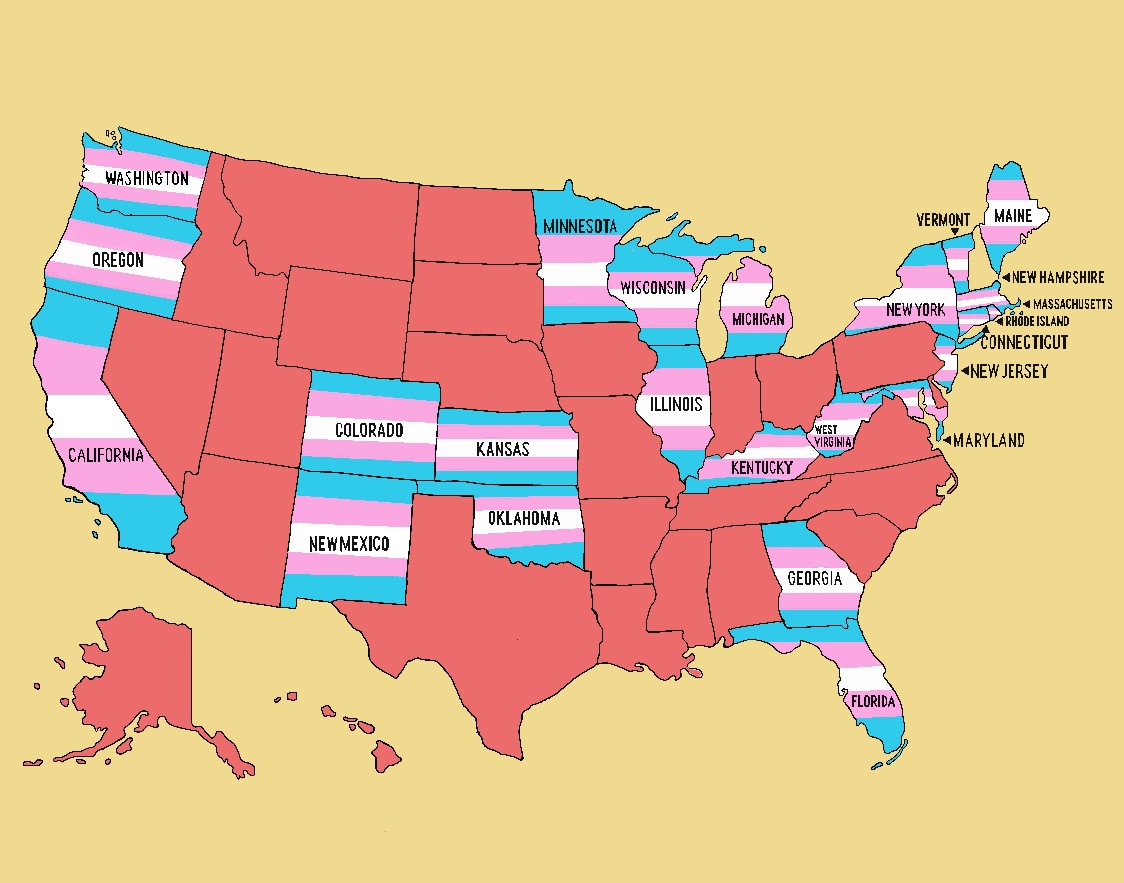Graphic by Paheli (She/Her)
In the past year or so, there has been a scourge of discriminatory legislation targeting the entire Queer community, transgender individuals in particular. Bills have been introduced in state legislatures that attack freedom of expression, access to gender-affirming care, education, and visibility for the transgender and broader Queer community. These laws are an astonishing and frightening violation of basic human rights and speak to a worrying rise in widespread anti-transgender intolerance. Essentially, conservative politicians are trying to write Queer and trans people out of existence.
Amid the uptick in anti-trans legislation and the anxiety that such attacks produce, it’s important to realize that the resistance being supplied by trans people and allies is significant. Most of the bills introduced in state legislatures have not passed into law and the rise in anti-trans legislation has also come with a surge of activism by trans people and allies in return.
Annise Parker, the then-mayor of Houston, Texas, made a powerful statement when a rollout of trans refuge bills were introduced in 2022: “When trans kids’ lives are on the line, playing defense doesn’t cut it. It’s time to play offense.” Legislators need to start putting real change onto their State Senate and House tables, and thankfully, the country is starting to see real change as outcry over anti-trans laws rises from legislators’ constituents.
As covered in a recent OutWrite article, the “Transgender Bill of Rights” was recently introduced into Congress by Representative Pramila Jayapal and Senator Edward J. Markey after failing to pass last year. This Bill would offer a broad scope of protections to transgender and nonbinary individuals, including protecting gender-affirming care, codifying Roe v. Wade, and barring discrimination and conversion therapy. Unfortunately, the Bill is somewhat of an empty promise, as it is unlikely to pass and does not clearly outline any consequences for failing to comply with the regulations. However, its existence is a hopeful first step in the direction of legal protections for transgender and nonbinary individuals.
On April 5, Governor Phil Murphy of New Jersey signed Executive Order No. 326, which protects people either receiving or providing gender-affirming care by banning New Jersey state officials from cooperating in other states’ investigations into people who have potentially received gender-affirming care in New Jersey. Essentially, this makes New Jersey a “safe haven,” in Gov. Murphy’s words, for transgender and nonbinary people seeking gender-affirming care — they can travel to New Jersey to receive such services and not be persecuted for it by the state they live in.
The executive order also solidifies P.L. 2017, c.176, a New Jersey bill which prohibits health insurers and providers from discriminating based on a patient’s gender identity and expression. The Bill explicitly mentions transgender people as the focus of the protection.
A few days prior, on Transgender Day of Visibility (March 31), New Jersey also released a new website that serves as an information hub specifically for transgender and nonbinary individuals. The site acts as a search hub and contains resources including information about changing one’s legal name, legal protections, and mental health support.
Minnesota has passed bill HF146 declaring themselves a “trans refuge state,” offering some of the same protections as New Jersey and preventing those who seek gender-affirming care in Minnesota from being persecuted in the state they reside in. In 2022, legislators in 19 other states committed to introducing trans refuge laws in their own states as soon as possible, similarly protecting trans people from penalties such as fines or even jail time when receiving gender-affirming care.
Since then, California, Colorado, Illinois, Massachusetts, New Mexico, Vermont, and Washington have either introduced or passed trans refuge — also sometimes called “safe harbor” — laws. Many of these laws also include protections for those seeking abortions in the state under the umbrella of “reproductive rights.” Some states, like Oregon, already had legislation in place protecting transgender individuals.
Queer people and straight allies around the country are continuing to fight for Queer rights; education and visibility will continue to be the best ways to do so. Queer people are the subject of hateful campaigns that teach people that they are something to fear, but transgender people and allies alike have continued attempts to humanize the transgender community and combat these harmful ideas.
Large organizations such as the Human Rights Campaign and the American Civil Liberties Union (ACLU), as well as a multitude of smaller ones, such as the Trans Justice Funding Project or the Marsha P. Johnson Foundation, openly fight for transgender rights and provide resources for education about transgender people. Additionally, many influential trans figures like Dylan Mulvaney, Hunter Schafer, and Elliot Page are using their fame to increase visibility and educate about transgender struggles and experiences. Every transgender person who is out and expressing themselves the way they want is actively resisting the oppressive systems that try to keep them hidden.
It’s tragic that there are still people attempting to compromise these basic rights, but our safety and joy as a community will always be something worth fighting for. Other Queer activists aren’t giving up yet, and there are lots of ways that others can join the fight, including increasing visibility of and donating to causes that forward Queer and trans interests and uplifting the voices of leaders in our community.
Credits:
Author: Emma Blakely (They/She/He)
Artist: Paheli (She/Her)
Copy Editors: Ava Rosenberg (She/They), Bella (She/They)

